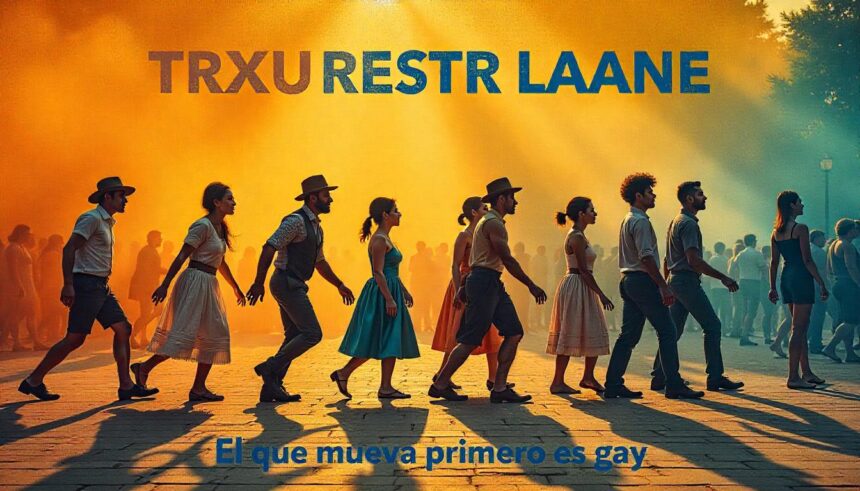Language is a fascinating tapestry woven from cultural threads. Each phrase we use carries unique meanings and implications that can shift dramatically across borders. If you’ve ever wondered how to say “whoever moves first is gay” in Spanish, you’re diving into a rich world of linguistic subtleties and social contexts.
This expression might seem straightforward at first glance, but its connotations vary widely depending on where you are. As language learners or enthusiasts, understanding the nuances behind phrases like this one helps us communicate more effectively while respecting diverse cultures. Let’s explore not just the translation itself, but also what it signifies in different Spanish-speaking regions and how best to navigate these conversations with care. Ready? Let’s get started!
The Importance of Understanding Cultural and Language Nuances
Language is more than mere words; it’s a reflection of culture. Understanding the nuances behind phrases can open doors to deeper connections with others.
Cultural context enriches communication. A phrase that seems harmless in one culture might carry serious implications in another. Misinterpretations can lead to misunderstandings and even offend someone unintentionally.
Engaging with language means embracing these differences. It allows us to appreciate diverse perspectives while fostering respect among communities.
When grasping idiomatic expressions, we also gain insight into social norms and values unique to each region or group. This awareness cultivates empathy, helping us navigate conversations thoughtfully.
In our increasingly interconnected world, cultural literacy becomes essential for effective dialogue. By appreciating the subtleties of language, we become better communicators and global citizens who celebrate diversity rather than shy away from it.
The Phrase
The phrase “quien se mueve primero es gay” is a colloquial expression popular in various circles. It captures an interesting cultural sentiment that can spark laughter or discomfort, depending on the context.
Essentially, it implies that whoever makes the first move in a situation—be it romantic or playful—is somehow labeled as “gay.” This notion plays on stereotypes and societal norms about masculinity and attraction.
Many people use this phrase jokingly among friends. However, its humor may not translate well across all cultures. Understanding the underlying implications is crucial to ensuring it’s received positively.
Language nuances matter greatly here. While Spanish speakers might chuckle at this saying, others could find it offensive or reductive. Awareness of these dynamics enhances our communication skills while navigating social situations involving different cultures.
Translation Variations in Different Spanish-Speaking Countries
Spanish is a rich language with numerous dialects across different countries. This diversity influences how phrases are translated and understood.
In Mexico, you might hear “el que se mueve primero es gay.” The tone can be playful or teasing among friends.
Meanwhile, in Argentina, the phrase could take on a more casual twist: “quien se mueve primero es maricón,” which may come off as harsher due to local slang nuances.
Colombians often prefer lighter expressions. They might say “el que hace el primer movimiento es gay,” keeping it friendly and lighthearted.
Understanding these variations helps bridge cultural gaps. It also ensures that humor doesn’t get lost in translation.
Cultural Implications and Misconceptions
Language is deeply tied to culture. When we translate phrases, we must consider their cultural weight. Saying “whoever moves first is gay” can carry different implications across Spanish-speaking countries.
In some regions, it’s purely playful banter among friends. In others, it might be seen as derogatory or insulting. Misinterpretations can lead to unintended offense.
Additionally, attitudes toward sexuality vary widely in the Hispanic community. What may seem humorous in one context could reinforce stereotypes in another.
Understanding these nuances helps avoid misunderstandings and promotes respectful communication. Being aware of local customs is crucial for fostering positive interactions.
Using this phrase without considering its impact risks alienating individuals within the LGBTQ+ community. Sensitivity matters when discussing identity and orientation, especially in diverse cultures where acceptance levels differ significantly.
How to Use the Phrase Appropriately
Using the phrase “quien se mueve primero es gay” requires a nuanced approach. It’s often thrown around in playful banter among friends but can easily be misinterpreted.
Context matters significantly. Only use it with people who understand your humor and feel comfortable engaging in light-hearted teasing. If you’re unsure, it’s better to err on the side of caution.
Tone is also crucial. A casual, joking demeanor can help convey that you mean no harm. Avoid using it in serious discussions or around individuals who may take offense.
Be aware of local cultural sensitivities as well. What might be acceptable in one region could be considered offensive elsewhere within the Spanish-speaking world.
Always listen to how others react when you say this phrase. Their feedback will guide you on whether it’s appropriate for future conversations.
Other LGBTQ+ Phrases in Spanish
Spanish is rich with expressions that celebrate LGBTQ+ identities. Familiarizing yourself with these phrases can enhance your understanding and appreciation of the culture.
One popular phrase is “salir del clóset,” which translates to “coming out of the closet.” This term signifies someone embracing their sexual orientation publicly.
Another interesting expression is “amor es amor,” meaning “love is love.” This simple yet powerful statement promotes equality and acceptance for all types of relationships.
In some regions, you might hear “mariquitas” affectionately used among friends. While it can be derogatory, context matters greatly in determining its intent.
Understanding these phrases provides deeper insight into the diverse experiences within the LGBTQ+ community. Whether you’re learning Spanish or exploring cultural nuances, each expression carries a unique story worth discovering.
Conclusion
Understanding how to say “whoever moves first is gay” in Spanish can be more than just a simple translation. It opens the door to discussions about cultural nuances and language variations that exist across different countries. The phrase itself, while often used humorously or playfully among friends, carries with it various interpretations depending on context.
Cultural implications are significant. What might seem like innocent banter in one culture could be offensive in another. It’s crucial to approach such phrases with an awareness of how they may affect others.
When using this phrase—or any similar expressions—consider your audience and the setting. Language is powerful, and it’s essential to use it mindfully.
Exploring other LGBTQ+ phrases in Spanish enriches our understanding of inclusivity within diverse cultures. Embracing these conversations fosters respect and acceptance among different communities globally.
Navigating language means navigating culture as well; doing so thoughtfully makes all the difference.







